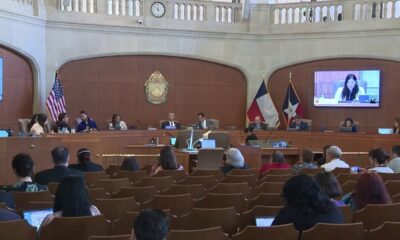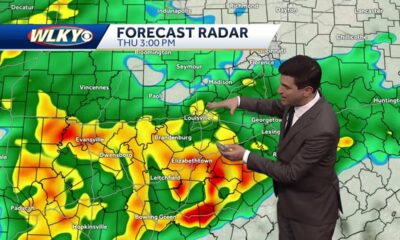News from the South - Alabama News Feed
School cellphone bans spread across states, though enforcement could be tricky
School cellphone bans spread across states, though enforcement could be tricky
by Robbie Sequeira, Alabama Reflector
February 24, 2025
Across the country, state lawmakers are finding rare bipartisan ground on an increasingly urgent issue for educators and parents: banning cellphone use in schools.
Fueling these bans is growing research on the harmful effects of smartphone and social media use on the mental health and academic achievement of grade to high school students.
In 2024, at least eight states — California, Idaho, Indiana, Louisiana, Minnesota, Ohio, South Carolina and Virginia — either expanded or adopted policies or laws to curtail cellphone use in schools.
GET THE MORNING HEADLINES.
This year, lawmakers in Alabama, Georgia, Maryland, Minnesota, Nebraska, New Hampshire, Oklahoma, Texas and Wisconsin have proposed bans moving in their state legislatures.
Arkansas Republican Gov. Sarah Huckabee Sanders last week signed a law requiring schools to ban students’ access to cellphones and other personal electronic devices during the school day.
Iowa Republican Gov. Kim Reynolds introduced a broader electronics device ban this year.
Last month, New York Democratic Gov. Kathy Hochul unveiled her plans to ban smartphones at schools.
And last week, Illinois Democratic Gov. JB Pritzker proposed a statewide ban on cellphones in classrooms.
Some experts warn, however, that these bans might be difficult to enforce — or may simply be outdated before they even take effect.
“The genie is out of the bottle, and squeezing it back in is going to be nearly impossible,” said Ken Trump, a longtime school safety expert and president of National School Safety and Security Services, a consulting firm. “Phones and social media have fundamentally changed society, and by extension, schooling. Outright bans may be unrealistic or difficult to enforce effectively.”
Trump thinks governors, in particular, are responding to a trend rather than conducting thorough research. “Our elected officials are running to say, ‘he [introduced a bill] so I’m going to do it too.’ … Once Florida passed their bill, it’s been an explosion.”
Florida in 2023 became the first state to enact an outright ban on cellphone use during instructional time, followed by Louisiana and South Carolina last year. Other states, including Alaska and Connecticut, issued recommendations rather than mandates, encouraging local districts to develop their own policies.
In Minnesota, districts are required to implement their own policies under the law passed last year. But a bill sponsored by Democratic state Sen. Alice Mann would ban cellphones and smartwatches in elementary and middle schools, and restrict the use of those devices in high school classrooms beginning in the 2026-2027 school year.
Mann began considering the measure after hearing directly from students last year.
“We had a committee hearing where kids told us how distracting cellphones were. That really caught our attention,” she said. “We talked to school districts across the state — some had no policy, some had bans for one or two years, and some had bans for longer. The ones with bans all said the same thing: ‘It’s been wonderful.’”
Enforcement
Even where bans exist, enforcement varies widely. Some schools use Yondr pouches, lockable sleeves that prevent phone access during the school day. Others require students to store their phones in lockers or classroom pouches, while some schools rely on simple classroom rules prohibiting phone use.
According to the Pew Research Center, 72% of U.S. high school teachers say that cellphone distraction is a major issue in their classrooms. While many teachers and administrators report positive changes after bans, students have quickly adapted, finding ways to bypass rules by slipping calculators or dummy phones into pouches, or switching to smartwatches to check social media and send texts.
“Students are more tech-savvy than lawmakers,” said Trump, the school safety expert. “They find workarounds — whether it’s through smartwatches, Chromebooks or school Wi-Fi.”
States such as Arkansas, Delaware, Idaho and Pennsylvania allocated funding for programs that provide schools with lockable phone storage pouches, or financial rewards for districts that create their own restrictive policies.
A proposed bill in Texas would go so far as to charge students up to $30 to retrieve a phone that was confiscated for violating a cellphone ban.
Schools have wrestled with how to regulate mobile devices for decades — with bans on devices such as pagers dating back to the late 1980s. In 2024, 76% of U.S. public schools prohibited cellphones for nonacademic use, notes the National Center for Education Statistics.
Total bans?
The Girls Athletic Leadership School Los Angeles has enforced strict no-phone policies since its founding in 2017. The charter school’s no-phone policy means no usage on campus, during off-campus experiences, or even on school buses — a step beyond most phone bans.
“Cellphones present a major distraction and temptation for students,” Vanessa Garza, Girls Athletic Leadership School Los Angeles executive director and founding principal, wrote in a statement to Stateline. “This long-standing policy has allowed our students to foster deep friendships, experience enhanced learning, and regulate healthy emotions.”
Instead of top-down state mandates, Trump, the school security expert, thinks that schools should focus on reasonable restrictions and consensus-based policies that work for individual communities.
“If you try to ban phones entirely, enforcement becomes a nightmare,” he said. “What happens when kids don’t comply? Are schools going to dedicate staff just to cellphone discipline? If policies aren’t enforced consistently, they become meaningless.”
Trump said in school emergencies, students flooding 911 with calls can overwhelm emergency responders.
If a parent needs to get in touch with their child, they can call the school, just like they always could before cellphones were in every pocket.
– Minnesota Democratic state Sen. Alice Mann
Mann, the Minnesota lawmaker, dismissed the idea that the pushback on phone bans is coming from students. Instead, she thinks parents are the ones most resistant to restrictions.
“Some parents are worried they won’t be able to reach their kids, but they absolutely can. If a parent needs to get in touch with their child, they can call the school, just like they always could before cellphones were in every pocket,” said Mann.
“What we’re hearing from students is that their phones are pinging in class all day long — and a lot of it is from parents. Parents texting, ‘What should we have for dinner?’ or ‘I’ll be home late.’ These are not emergencies.”
Stateline is part of States Newsroom, a nonprofit news network supported by grants and a coalition of donors as a 501c(3) public charity. Stateline maintains editorial independence. Contact Editor Scott S. Greenberger for questions: info@stateline.org.
YOU MAKE OUR WORK POSSIBLE.
Alabama Reflector is part of States Newsroom, a nonprofit news network supported by grants and a coalition of donors as a 501c(3) public charity. Alabama Reflector maintains editorial independence. Contact Editor Brian Lyman for questions: info@alabamareflector.com.
The post School cellphone bans spread across states, though enforcement could be tricky appeared first on alabamareflector.com
News from the South - Alabama News Feed
Alabama immigration enforcement bill gets approval from 2nd House committee
by Ralph Chapoco, Alabama Reflector
April 3, 2025
An Alabama House committee Wednesday approved an immigration bill that had already received another committee’s approval earlier in the session.
The House Judiciary Committee approved HB 7, sponsored by Rep. Ernie Yarbrough, R-Trinity, which would give local law enforcement the authority to enforce the country’s immigration laws.
“There are no new laws added,” Yarbrough said to committee members during the meeting. “It simply allows that partnership to take place just to address safety in our communities.”
GET THE MORNING HEADLINES.
Judiciary approved the bill about six weeks after the House Public Safety and Homeland Security did so in February. It is unusual for a bill to go through two committees before going to the floor of the House for a vote. The last major legislation to get routed through two House committees was the bill legalizing medical cannabis in Alabama in 2021.
The current bill, largely unchanged from last year, allows local law enforcement, such as sheriff’s offices and police departments, to enter into agreements with federal agencies to arrest and detain people who are not legally authorized to reside in the country.
Once in custody, deputies and police officers must then attempt to determine a person’s immigration status and get the help of an interpreter to determine someone’s nationality.
If a person cannot provide documentation proving they are eligible to live in the country, local law enforcement may then reach out to a Law Enforcement Support Center (LESC) to get information about a person’s immigration status.
The bill states that people cannot be detained solely because of their immigration status unless authorized by Immigration and Customs Enforcement, and that sheriffs’ deputies and police departments will verify that a person has an arrest warrant within 24 hours of the person getting detained.
Law enforcement must also obtain documents to verify a person’s immigration status, bet that a passport or a permanent resident card.
House Judiciary Committee members approved an amendment making a few of the requirements optional. A previous version required the Alabama Attorney General’s Office to publicly name any agency failing to comply with provisions in the legislation and notify the governor’s office.
The updated language gives the AG’s Office an option to inform the Governor’s Office.
Another amendment also allows, but doesn’t require, local law enforcement to report the total number of people arrested and the number of foreign nationals they take into custody as well as the inquiries they make to the LESC.
Immigration advocates who spoke at a public hearing on the legislation in March said the legislation is creating fear among immigrant communities. That, they said, would lead to mistrust toward law enforcement and increased school truancy for children of immigrants who are afraid to attend school for fear of their parents being deported.
Democrats on the House Judiciary Committee criticized the legislation.
“What country do we border in Alabama?” asked Rep. Penni McClammy, D-Montgomery during the committee meeting Wednesday.
Yarbrough said that every state is connected, and that people travel.
“Each state doesn’t have a physical wall, so people travel from state to state,” Yarbrough said.
YOU MAKE OUR WORK POSSIBLE.
Alabama Reflector is part of States Newsroom, a nonprofit news network supported by grants and a coalition of donors as a 501c(3) public charity. Alabama Reflector maintains editorial independence. Contact Editor Brian Lyman for questions: info@alabamareflector.com.
The post Alabama immigration enforcement bill gets approval from 2nd House committee appeared first on alabamareflector.com
News from the South - Alabama News Feed
New Tariffs Could Raise Car Prices | April 2, 2025 | News 19 at 10 p.m.
SUMMARY: A 25% tariff on foreign cars and auto parts is set to take effect at midnight, potentially raising prices for consumers. While current inventory and cars already at U.S. ports will remain at existing prices, future pricing remains uncertain. Dealerships in North Alabama say it’s too early to know the full impact, but warn that repair costs may also rise due to higher parts prices. Some manufacturers may absorb part of the tariff, while others could pass the full cost to buyers—raising a $30,000 car to nearly $40,000. Dealerships report a recent surge in buyers trying to purchase before prices rise.

A 25% tariff on any foreign cars or auto parts will go into effect in a couple of hours.
News 19 is North Alabama’s News Leader! We are the CBS affiliate in North Alabama and the Tennessee Valley since November 28, 1963.
https://whnt.com/
https://www.facebook.com/whntnews19
https://www.instagram.com/whntnews19/
https://twitter.com/whnt
News from the South - Alabama News Feed
Weather Fun 1on1: Brylee explains why thunderstorms occur more often in the summer than in the wi…
SUMMARY: Meteorologist Brylee Brown explains why thunderstorms are more common in summer than winter in her “Weather Fun 1-on-1” segment. Joined by Aidan, they conduct an experiment using two bowls of air at different temperatures. The warm air inflates a balloon, demonstrating that warm air is less dense and rises, while cold air causes the balloon to deflate. This principle helps explain why summer afternoons often bring air mass thunderstorms, as humid, warm air is abundant. In winter, less warm air means these storms are rare. For more weather science resources, viewers can scan a QR code or visit the website.

Weather Fun 1on1: Brylee explains why thunderstorms occur more often in the summer than in the winter
Subscribe to WVTM on YouTube now for more: https://bit.ly/2jvAaUD
Get more Birmingham news: http://www.wvtm13.com
Like us: https://www.facebook.com/WVTM13/
Follow us: https://twitter.com/WVTM13
Instagram: https://www.instagram.com/wvtm13/
-

 Mississippi Today1 day ago
Mississippi Today1 day agoPharmacy benefit manager reform likely dead
-

 News from the South - Alabama News Feed7 days ago
News from the South - Alabama News Feed7 days agoSevere storms will impact Alabama this weekend. Damaging winds, hail, and a tornado threat are al…
-

 News from the South - Alabama News Feed6 days ago
News from the South - Alabama News Feed6 days agoUniversity of Alabama student detained by ICE moved to Louisiana
-

 News from the South - Oklahoma News Feed5 days ago
News from the South - Oklahoma News Feed5 days agoTornado watch, severe thunderstorm warnings issued for Oklahoma
-

 News from the South - Virginia News Feed6 days ago
News from the South - Virginia News Feed6 days agoYoungkin removes Ellis, appoints Cuccinelli to UVa board | Virginia
-

 News from the South - Kentucky News Feed7 days ago
News from the South - Kentucky News Feed7 days agoA little early morning putting at the PGA Tour Superstore
-

 News from the South - Georgia News Feed5 days ago
News from the South - Georgia News Feed5 days agoGeorgia road project forcing homeowners out | FOX 5 News
-

 News from the South - North Carolina News Feed7 days ago
News from the South - North Carolina News Feed7 days agoArtificial intelligence experiment begins in North Carolina treasurer’s office | North Carolina








































